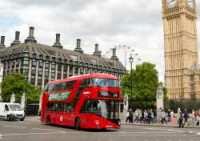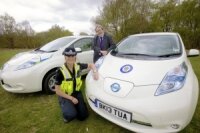LATEST NEWS
28 July 2015
Barcelona Police Department Goes Electric
 |
The Barcelona Police Department is reducing its CO2 emissions by 80 tonnes over the next three years by switching to electric scooters. A 48 month contract for the rental of 198 electric scooters undertaken as part of the GPP 2020 project resulted in zero carbon dioxide emissions from fuel consumption and an 87% total reduction in CO2 emissions from the scooter fleet by 2018.
The scooters are being introduced incrementally, with early pilots helping to iron out potential problems and ensure that the technology is mature enough to be used by the Police Force. A significant upfront investment was required to install the appropriate charging technology throughout the city, but this outlay is expected to be balanced by a saving on fuel costs in the long term.
As well as the clear CO2 savings, the electric scooters are expected to improve local air quality in Barcelona and contribute towards reducing sound pollution around the city.
For more information on this and other tenders carried out within the GPP 2020 project, please visit their Low Carbon Tenders page.
Copyright: Barcelona Police Department
28 July 2015
Clean Fleets Materials available in six languages
 |
The Clean Fleets Guide and Training Package are now available for download in six different languages.
The Guide aims to assist public authorities and public transport operators in purchasing clean and energy efficient vehicles in full compliance with European legislation – in particular the Clean Vehicles Directive (CVD).
The Training Package is designed to present practical tools, supported by best practices, on the implementation of the CVD and enable trainees to repeat the training themselves in their own countries
To access these materials in the language of your choice please click on the link below:
A hard copy of the Guide is also available in English - email for your copy!
29 June 2015
Learn online with the Clean Fleets Training Package
 |
During 2014, the Clean Fleets Consortium organised two ‘Train the Trainer’ workshops on the Clean Vehicles Directive (CVD), which were tailored towards trainers, consultants and experts in public procurement or leasing of vehicles.
The idea behind these workshops was to present practical tools and methods to help implement the CVD and enable attendees to repeat the training themselves in their own countries.
Increased procurement of low carbon and alternative fuelled vehicles is a principal aim of the Clean Fleets project and we want to ensure our training is available to everyone, even if you weren’t able to attend the workshops.
The Clean Fleets team have been working hard to bring our comprehensive training package on the Clean Vehicles Directive direct to your computer. Each module is now available as a video presented by members of the Clean Fleets team, with the accompanying PowerPoint presentation.
Get started now by heading over to the Train the Trainer page and clicking on the Playlist link.
10 June 2015
What next for the Clean Vehicles Directive?
 |
As the Clean Vehicles Directive undergoes a period of review, we asked Clean Fleets project coordinator Simon Clement to share his views with us on the CVD and the Clean Fleets Policy Recommendations:
It seems very apt that the Clean Fleets Project should come to an end during a review of the Clean Vehicles Directive (CVD). For the last three years, alongside partners from Italy, Spain, Romania, Germany, the Netherlands, Sweden, Hungary, Bulgaria and the UK I have been working with local authorities to implement the CVD and procure cleaner, more energy efficient public fleets. I have been impressed time and again by the efforts undertaken across Europe – from the joint procurement of 1,000 electric vehicles in Sweden, to the development of a new, hyper-efficient hybrid bus in London, or the introduction of the first EEV buses in Baia Mare in Romania.
At the same time I have seen just how big the challenges are for city administrations – cities striving to achieve CO2 emission reductions, and cleaner air for their citizens, but faced with ever shrinking budgets and a confusing array of new technologies and fuels. For me, the need for exchange between cities, and support for procurers and city decision makers, which Clean Fleets has tried to contribute to, has never been stronger.
I feel the CVD is a useful contribution to promoting the uptake of alternative fuel vehicles (AFVs) in Europe’s cities, by obliging public authorities and public transport operators to consider energy efficiency, CO2 emissions and local pollutants such as particulates and NOx.
However, it isn’t perfect. The lack of any agreed minimum standard for environmental performance, and the confusing but fixed methodology offered by the Directive for monetising environmental impacts in procurement, are amongst the most significant problems. More broadly, the widening gap between emissions and fuel consumption data provided by manufacturers according to official test cycles, and the real on-road performance, makes it very difficult for procurers to make informed decisions.
The CVD review process so far has been open and participatory, and the high level of responses from public authorities shows just how important the CVD really is. The Clean Fleets policy recommendations are based on the opinions and experiences of cities from across the European spectrum, with varying budgets and differing policy objectives. We have done our best to draw some common themes from these varied contexts to try and help make a revamped version of the CVD an even more effective driver for the AFV market.
The future of the European vehicle market is difficult for anyone to predict, but what is clear is that
a) we quickly need to move away from petrol and diesel, and
b) city authorities are a key actor in helping to achieve this transformation, and must be closely involved in policy making processes.
27 May 2015
Share your thoughts on the Clean Fleets Policy Recommendations
 |
The Clean Vehicles Directive, or the Directive on the Promotion of Clean and Energy Efficient Road Transport Vehicles (2009/33/EC) as it is more formally known, is currently under review and we are looking for your input. Drawing on the findings and expertise of the Clean Fleets Consortium, we have developed a series of policy recommendations for European and national policy makers.
These recommendations aim to help increase the uptake of alternative fuelled vehicles within Europe’s publicly owned or controlled vehicle fleets. They are focused mainly on the procurement of clean vehicles, but also touch on broader issues such as financial incentives and the quality of emissions data.
The recommendations will form the basis of our input into the review process and we would very much like to include your views.
Let us know what you think by emailing by Friday 26 June with your feedback on the policy recommendations. We will ensure that that these are collectively shared with the European Commission.
4 May 2015
Final Clean Fleets workshop looks at frameworks for the future
 |
If we are to reduce greenhouse gas emissions and improve air quality within our cities, there is a need for a rapid and wide-scale introduction of alternative fuelled vehicles into publicly owned fleets. This can only be achieved with the support of national and European level policy makers.
The Clean Fleets Project has been working with public authorities and fleet operators since September 2012 to help implement the EU Clean Vehicles Directive and encourage procurement of clean and energy efficient vehicles.
Drawing on these experiences, a series of policy recommendations have been drafted to help ensure a supportive policy and legislative framework for future clean vehicle procurement. In order to ensure these suggestions are pertinent and achievable, we would like to invite you to explore the issues raised with us.
A half-day policy workshop is being organised in Brussels (Belgium) on the morning of 21 May 2015. The workshop will consist of presentations and a lively discussion looking in depth at what has been achieved so far and what is needed to ensure a faster uptake of alternative fuelled vehicles in the future. The event is free of charge and registration is open until 14 May 2015.
For more information or if you would like to attend, please contact .
27 April 2015
Transport for London puts alternative fuels on trial
 |
London is a lead city partner of the Clean Fleets project and has very ambitious plans when it comes to reducing emissions in its vehicle fleet. Transport for London (TfL) has been involved in trialling a range of new fuel technologies to establish the best mix of low and zero carbon vehicles for the city’s needs.
Following a competitive tender process, TfL awarded contracts for the design, build and delivery of 3 induction charged buses to be on the roads by the summer of 2015. These buses are zero emissions capable and use geo-fencing to switch from diesel to electric mode in emission hot spots across London.
A second vehicle being rolled out is the new Bus for London. This has a hybrid engine which emits less than half the CO2 and NOx of a current diesel bus, reducing CO2 emissions in the capital by around 20,600 tonnes a year. Importantly, when fuel savings and loading advantages are taken into account, the bus works out at about the same price as a standard diesel alternative.
TfL has also negotiated a Framework agreement allowing bus operators to retrofit existing buses with NOx abatement equipment. One thousand Euro 3 buses are expected to be upgraded, giving savings of approximately 536 tonnes of NOx each year.
It is not just buses which need to clean up their act. A further Mayoral target involves converting 10% of the support fleet, used to deliver the materials for maintaining TfL transport infrastructure, to zero emissions vehicles.
TfL currently have two hydrogen fuel cell Hyundai iX35s, seven electric cars and four electric vans in their support fleet. Charging infrastructure is being installed, with the introduction of 120 new electric vehicles planned in the near future.
The new fuel technologies will be on display at a Clean Fleets workshop in London (UK) this Thursday 30 April.
For more information and to register, visit the National Workshops page.
22 April 2015
SURVEY ON THE ‘CLEAN VEHICLE DIRECTIVE’ - SHARE YOUR VIEWS!
 |
The European Commission (DG MOVE) has recently launched a study to undertake an ex-post evaluation of the ‘Clean Vehicle Directive’ or CVD.
The aim of this evaluation is to provide a clear, evidence-based assessment of the impacts of the Directive as it currently stands, and an assessment of whether the Directive is the most effective and appropriate choice with respect to achieving EU-wide objectives and contributing to better policy-making in Europe.
The Clean Fleets project is supporting Ricardo-AEA and TEPR who have been contracted to carry out this evaluation on behalf of the Commission, and are undertaking extensive stakeholder engagement with public organisations who have procured road transport vehicles since the start of 2012 via an online survey.
We are asking Clean Fleets readers to take the opportunity to share their views, by completing this survey which will be online until Friday, 24th April 2015.
The survey is available in six languages and can be accessed via the following links:
- English: https://www.surveymonkey.com/s/Cleanvehicles
- French: https://www.surveymonkey.com/s/CVD_FR
- German: https://www.surveymonkey.com/s/CVD_DE
- Hungarian: https://www.surveymonkey.com/s/CVD_HU
- Italian: https://www.surveymonkey.com/s/CVD_IT
- Spanish: https://www.surveymonkey.com/s/CVD_ES
For reference, the EU Directive is available in different European languages can be found here and a list of the corresponding national legislation can be found here.
For any questions about the survey, please contact .
13 April 2015
Global Lead Cities Network on sustainable public procurement launched
 |
Seoul Metropolitan Government and ICLEI have joined forces to establish a Global Lead Cities Network on Sustainable Public Procurement (SPP). The aim is to create a worldwide network of leading cities that share and develop their capabilities to implement sustainable and innovation procurement, driving a transition to sustainable production and consumption. The network was launched at the ICLEI World Congress in Seoul (Republic of Korea) on 11 April 2015.
The network marks a recent growth in international interest and understanding of the importance of procurement in the fight against climate change. It has been set up to raise awareness of the benefits of sustainable and innovation procurement, and to help develop a supportive political framework. According to the United Nations Office for Project Services, an average of 15 percent of global gross domestic product is spent through public procurement systems each year, amounting to over $10 trillion. Public authority spending has real potential to change the future, achieve significant value for organisations and provide tangible benefits to the environment and the well-being of our society.
Cities including Seoul (Republic of Korea), Cape Town (South Africa), Helsinki (Finland), Ghent (Belgium) and Rotterdam (The Netherlands) are amongst the founding participants. They commit to take an exemplary role globally by putting SPP into action through setting ambitious, quantified targets for its implementation, developing a clear implementation strategy and undertaking an evaluation of performance. The cities will act as global and regional champions of SPP, committing to promote and accelerate its wide-scale adoption by other cities.
For more information, view the press release.
16 March 2015
Upcoming Clean Fleets Workshop in Rotterdam
 |
A Clean Fleets workshop is taking place this Thursday 19 March in the Dutch city of Rotterdam.
The workshop will focus on practical aspects of tendering and the implementation of a charging infrastructure for electric vehicles in the Rotterdam region.
This forms part of a series of national workshops which have taken place throughout the project in nine different European countries.
Workshops will also be held in London (UK) and Zagreb (Croatia) in April 2015.
For more information and to register for the Rotterdam workshop, email .
12 February 2015
Public authorities leading on electric vehicle uptake in Britain
 |
New research published by the Glasgow-based company Intelligent Car Leasing suggests that public procurement is helping to boost the electric vehicle market in the UK.
The study, which is based on data from 433 councils, shows that around 40 per cent of local authorities in England, Scotland and Wales have at least one electric vehicle in their fleet.
The attraction of EVs lies in their low running costs and potential to significantly reduce negative environmental impacts. This is particularly true in the case of local air pollution, which has become an acute problem in many cities.
Uptake has been further boosted by government investment in charging infrastructure. This can be seen clearly in Scotland, where over the last 2 years the government has invested £17 million (around €23 million) in low emission vehicle initiatives. With this information in mind, it is perhaps unsurprising that four of the top five EV-users on the list are Scottish public authorities.
"Electric vehicles are still expensive to obtain, even when taking into account government grants and incentives,” said a statement released by Intelligent Car Leasing "Therefore many of the local authorities across the UK are presenting themselves as real early adopters; taking up this promising technology at an early stage in its life-cycle."
This early enthusiasm for electric is predicted to grow as renewable energy sources become cheaper and more readily available, creating cheaper and cleaner sources of electricity.
Source: Business Green

















